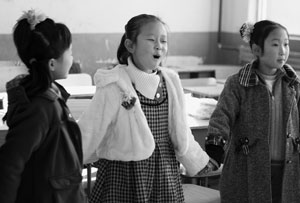 Moved by the plight of migrant children in China, Judy Shen established CAI (pronounced cai) in Beijing in 2006 while undertaking her Fulbright Scholarship. “The reason I chose to work with migrant children is simply because I was struck by the large number of them in this country – 20 million by last estimates,” says Shen. The name, CAI, from the Chinese character 才, translates as “talent.” Her organization’s mission is to encourage and nurture this quality in migrant children.
Moved by the plight of migrant children in China, Judy Shen established CAI (pronounced cai) in Beijing in 2006 while undertaking her Fulbright Scholarship. “The reason I chose to work with migrant children is simply because I was struck by the large number of them in this country – 20 million by last estimates,” says Shen. The name, CAI, from the Chinese character 才, translates as “talent.” Her organization’s mission is to encourage and nurture this quality in migrant children.
Although the Chinese government has made steps to provide free education for all children through Year 9, the access and quality of schooling remains a serious problem. “I was saddened by the disparate treatment between the migrant and city population,” says Shen. “I wanted to build an organization that taught children the fundamentals that help strengthen their resilience.” CAI builds on the existing curriculum by offering art, music and sports courses that the cash-strapped and resource-poor migrant schools are unable to provide.
A dedicated team of volunteer teachers, both Chinese and foreign, teach children classes ranging from basketball to painting. But teachers also aim to instill what they call the four Cs: Confidence, Commitment, Care, and Courage. With no permanent home or community, migrant children are at higher risk of joining gangs in an effort to find a sense of stability and family. CAI hopes that by teaching children how to respect themselves and others, they can help them become productive members of society.
Ellen Luo, a consultant for CAI, has seen the positive changes herself. “One of my favorite stories is about Liu Rui. She was one of the shyest students in the group – regularly hanging back during class and never having the courage to participate fully in activities,” says Luo. As Liu Rui’s confidence grew, so did her outlook on life and she was able to interact more openly with her teachers and classmates. One of those teachers, Mrs. Shen, recalls the final day of school when Liu Rui walked up and handed her a letter. “Everything you said has given me much enlightenment. When I grow up and am able to find a job, I will also become a volunteer to enrich migrant children’s lives by teaching them arts,” the letter read. Luo believes that even minor changes like the ones she saw in Liu Rui can drastically change the future prospects of migrant children.
Dulwich senior student Jorge Zarate has experienced firsthand the rewards of working with Beijing’s migrant children. After CAI visited his school, Zarate was inspired to design a pilot program for the organization in which Dulwich seniors specializing in different fields would teach a class of migrant children every week. The proposal was accepted and their first semester has been a great success. Zarate sits in on the sports, drama, English and music classes that are taught each week, keeping tabs on students and supervising the teachers.
On a recent Saturday morning while observing a drama class, Zarate smiles and points out a young girl no older than 12. “She’s one of this class’s most enthusiastic students – her dream is to be a Beijing opera singer.” Zarate and his fellow Dulwich student volunteers make it their mission to encourage the children in their care to dream big and think outside the box.
Despite the wonderful work that CAI does with migrant students directly, Shen also recognized the need to go beyond their own schools. To date, CAI has trained over 120 teachers in rural schools across two provinces. After their intensive training courses, CAI hopes teachers will not only be able to teach more effectively but retain higher class numbers in some of China’s poorest areas. “Our goal is to improve teaching quality in rural China. Each teacher has the capacity to impact 100 to 150 students in an academic year,” says Shen.
CAI relies largely on the support and contributions of volunteers within the community. In the past, people have donated film for photography classes, money for classroom rent, and their own time to assist with various roles ranging from administrative duties to teaching. Shen has seen many of her colleagues transformed as a result of their involvement in her organization. “Through CAI, I learned one can shape his or her experience in China and that every individual has the potential to make a difference.”
CAI is always looking for volunteers, school supplies and donations. If you’re interested, e-mail ellen@cai-china.org. For more information, visit www.cai-china.org.



